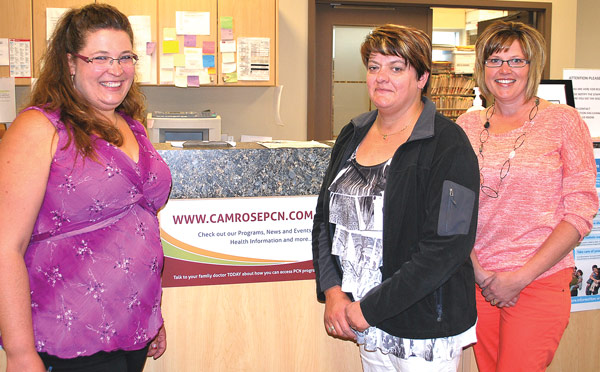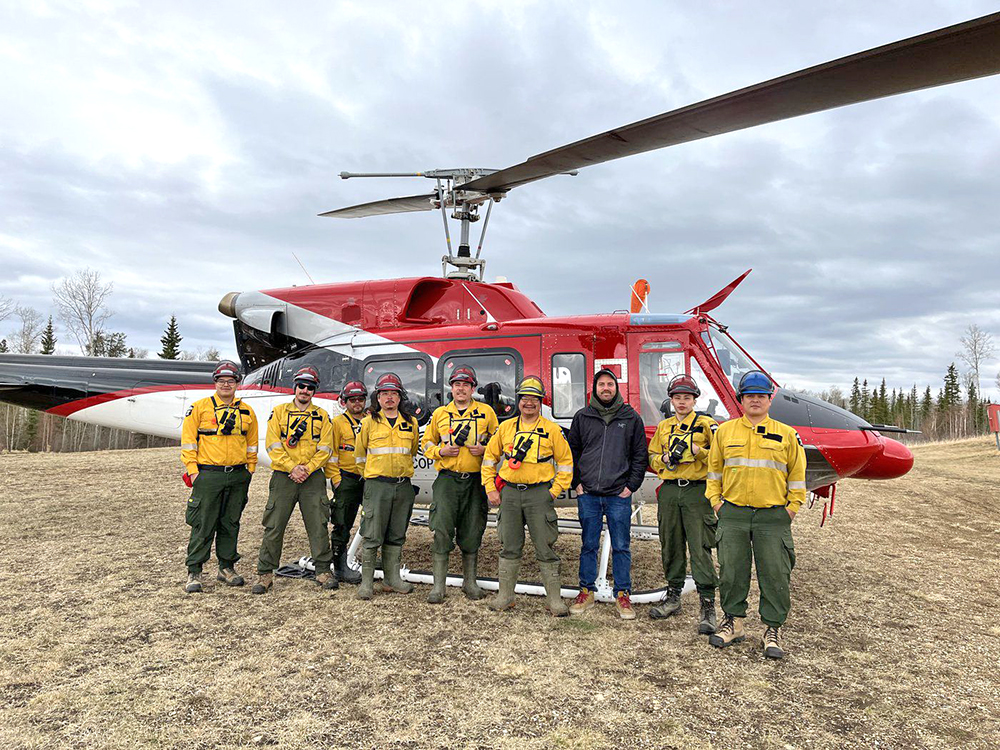Camrose PCN makes proactive health care a priority

Traditionally, medical services and professionals were focused on health care from a reactive standpoint. When people got sick, or injured, they sought treatment. Acute-care hospitals were funded, built, and staffed to maintain the level of service required to meet the needs of acute care patients.
Health providers in Alberta are now recognizing that lifestyle, diet, and exercise changes can help prevent illness and manage chronic disease.
Healthcare professionals are seeing great value in preventative medicine, and giving patients a bigger role in managing their own care.
Patients have more tools and knowledge, and work in a true partnership with their doctors, especially those who are dealing with chronic disease like diabetes, high blood pressure, high cholesterol, and others.
This is the philosophy behind the start of Primary Care Networks (PCN) like the Camrose PCN.
The idea for the Camrose PCN started back in 2006, and became operational in 2008, now the Daysland Medical Clinic, Forestburg Clinic, and Dr. Botha, in Hardisty are also part of the Camrose PCN network, which includes 34 physicians and serves nearly 31,000 patients from Bashaw to Hardisty.
In the Daysland and Forestburg Clinics, the PCN employs staff members who form a patient care team with the Daysland and Forestburg clinic physicians, working directly one-on-one with patients.
For Pam Sherman, Nurse Lead in Daysland, working for the PCN fits perfectly into her philosophy. She says, “When I graduated as an RN, I made a commitment to myself that I would remember that I am not doing this just for money, but for the love of nursing.”
Raising a family took Sherman away from nursing for a while, and she re-entered the work force first as an RN in Daysland Hospital, and then in the Forestburg Clinic staff.
At that time, the extent of her patient care duties were doing blood collections, and putting people into rooms.
Sherman stayed with the Daysland/Forestburg Clinic through the transition into joining the PCN, working at both locations, and she now does most of her work out of the Daysland Clinic.
“As we morphed into the PCN, I found myself doing less administrative work and more direct patient care.
“I had new parameters to work with.”
Sherman did some training with the Camrose PCN, and with Kalyna Country PCN (in the Beaver County area), and then really had the freedom to design her role in the clinic.
“As a PCN RN, I am able to work with chronic disease management, pre-natal risk reduction, and preventative medicine.
“It’s a chance to use my knowledge, and I have the opportunity to work one on one to give power back to the patient, along with tools and knowledge.”
She adds, “Not only does it free up the doctor’s time, but this way the patient has more control.”
Sherman will do an initial assessment with a patient after they’ve seen the doctor, and she says those can take up to an hour, or hour-and-a-half.
“One of the first questions I ask is, ‘I know why your doctor referred you to me, but what is most important to you?’
“If I can address that first, it can help the patients see find their path to recovery or disease management.”
She gives an example of a recent patient referred to her with high cholesterol levels.
“He was more concerned with his weight than his cholesterol levels,” she said, “and we set up a number of referrals for him, including an exercise referral.
“He was ecstatic that someone would design a diet and exercise program just for him,” she says.
“We find people’s barriers and work around or through them, whether they are physical, mental, or even financial.
“We talk to them, and can also refer them for other specialized care, like maybe a dietician, or whatever else they need.”
“Healthcare is not just about your [insert diagnosis here]. We can talk about anything impacting a patient’s health or mental state; we can talk about alcohol use.
“Can you imagine? This is the vision I have for health care, and it’s already here.”
Sherman consults back with the PCN physicians on a one-on-one basis.
Working with pre-assigned parameters, Sherman is also able to order repeat blood works and some lab tests that are designated as coming from a patient’s physician, with results going directly to the doctor.
Mary Ann Schneider, who is a Licenced Practical Nurse, or LPN, with the Daysland and Forestburg clinic works with patients once Sherman has done their initial assessment.
She says, “Setting up that bond with our patients is great. “It’s so meaningful, on my end and theirs.”
Schneider has worked for 23 years as a LPN, and still works on a casual basis at the Daysland Hospital.
“I had a PCN ‘epiphany’ at the beginning of the year,” she says, “that’s when I came on board, and I have no regrets from the change at all.
“It’s been amazing, seeing the whole group work together from the top down on the patients’ care.”
Schneider, and Lenee Reiman, who works in the Forestburg Clinic, follow up on patients’ care regimens, they offer another level of support and personal care, and can help patients fine tune treatments, or make referrals as needed.
“We work with patients, we review their results, seeing them improve, or work with making a program more effective if they are not,” Schneider says.
Reiman and Schneider agree that their skills are used much more fully at the PCN than in a traditional setting.
Schneider says, “I feel used to the full scope of my knowledge and abilities here. I am encouraged to keep educating myself, too.
“In the Camrose PCN, the focus is more on what I can do.”
She says that from her work in acute care, she can see where more patient-led management is a positive thing.
Reiman is flourishing within her new responsibilities.
Her role is a little different in the Forestburg Clinic, she’s doing patient follow ups, and says she will also join in while the doctor is seeing a patient to provide more information on an as-needed basis.
She finds the educational opportunities through the PCN more patient focused, and easier to access.
Camrose PCN Clinical Manager Colleen McKinstry says it is a priority of the PCN that all team members explore education opportunities that are meaningful to what they do.
“Like chronic disease management,” says Schneider.
While Schneider made a conscious choice to be a part of the team, Reiman was unsure what the clinic’s change to a PCN, would mean for her.
“I was nervous at first,” she says.
Reiman said it wasn’t long before she could see that the changes were all positive, not only from her point of view but for patient’s overall care.
Reiman is in the middle of an active review of all the Forestburg Clinic’s patient charts at the moment, as well, something both Schneider and Sherman would like to eventually get done as well.
“Our patients are having very proactive office encounters with the PCN,” she says.
“Patients can now come in before their appointments and we can schedule the lab work so that the doctor has results back during their first visit.
“That gets things started.”
“Mine is a very rewarding position,” she says.
The PCN works with existing healthcare professionals outside the network, too, and Colleen Lindholm, Communications Lead for Camrose PCN, says, “Within the PCN we are allowed to be creative and build relationships with Alberta Health Services (AHS).”
That can often be a win-win situation for local programming that might be otherwise under-utilized.
Part of the goal of PCN administration is to make local connections in the region to enhance patient care, and avoid duplication of services that may already be being offered in the community.
Sometimes the ideas are more creative, like real-time, secure teleconferencing between the patient, doctor, and specialist.
That’s one vision the PCN sees for Hardisty patients of Dr. Botha, a solution that can eliminate some travel, and allow patients, doctors, and other healthcare specialists to work together to build a care plan.
Dr. Peter Huang, at the Daysland Health Care Centre says the change to the Camrose PCN has been profound for him as well.
“Our schedules are very busy,” he says, “having Pam and Maryanne around has filled in the blank spaces, and has really helped us with the backlog of patients.”
Clinic staff have noticed a change for the positive as well.
Terry Dolanz says, “What I have seen is that when people are coming in to see Pam or Maryanne, they are all gung-ho.
“People are coming in more routinely for their followup visits, and with more enthusiasm.”
She says it’s also great to have an RN and LPN at the office to help with patient care.
“They take on or start a lot of the tasks, and I know they go over the results of any testing, so the doctors appreciate the help, too.
“I can’t see anything negative about it [being part of the Camrose PCN].”
Leslie Cholowsky
Editor








